$70K or Less, No Compromises: The 2025 Sports Cars That Still Shock
Forget "affordable." This is about ruthless performance at a steal. The 2025 sports car market under $70K isn’t playing nice: we’re talking Corvettes humbling supercars, Mustangs with factory-installed rage, and Porsches that out-handle bank accounts twice their size.
The new rules?
- Speed is cheap now. 0-60 in under 3 seconds? Base model.
- Luxury isn’t optional. Carbon fiber, drift modes, and AI copilots—standard.
- Weakness? Discontinued. No V8? No manual? No thanks.
This isn’t a "budget" list. It’s a hit list; the fastest, sharpest, most addictive cars you can actually afford. Let’s ruin your practicality forever.
See also:
Methodology: How We Selected The Best Sports Cars
We didn’t pick favorites; we set traps. To make this list, a car had to dominate in:
Performance: Sub-4-second 0-60? Mandatory. Horsepower under 300? Disqualified. Handling had to hurt feelings on backroads.
Price: $70K cap, including the trims you’d actually want. No stripper models.
Tech and Toys: Laggy touchscreens? Out. Track telemetry, launch control, and seats that grip like a ex’s grudge? In.
Reliability: Fast is easy. Fast and not broken by 50K miles? That’s the list.
No participation trophies. Just proof you don’t need six figures to embarrass exotics.
Top 10 Sports Cars Under $70,000 In 2025
1. 2025 Chevrolet Corvette Stingray: The American Supercar Slayer
- Price: Starting at $68,300
- Engine: 6.2L V8 (490 hp, 465 lb-ft torque)
- Performance: 0-60 mph in 2.9 seconds
- Key Features: Mid-engine layout, 12-inch digital cockpit, track-ready handling
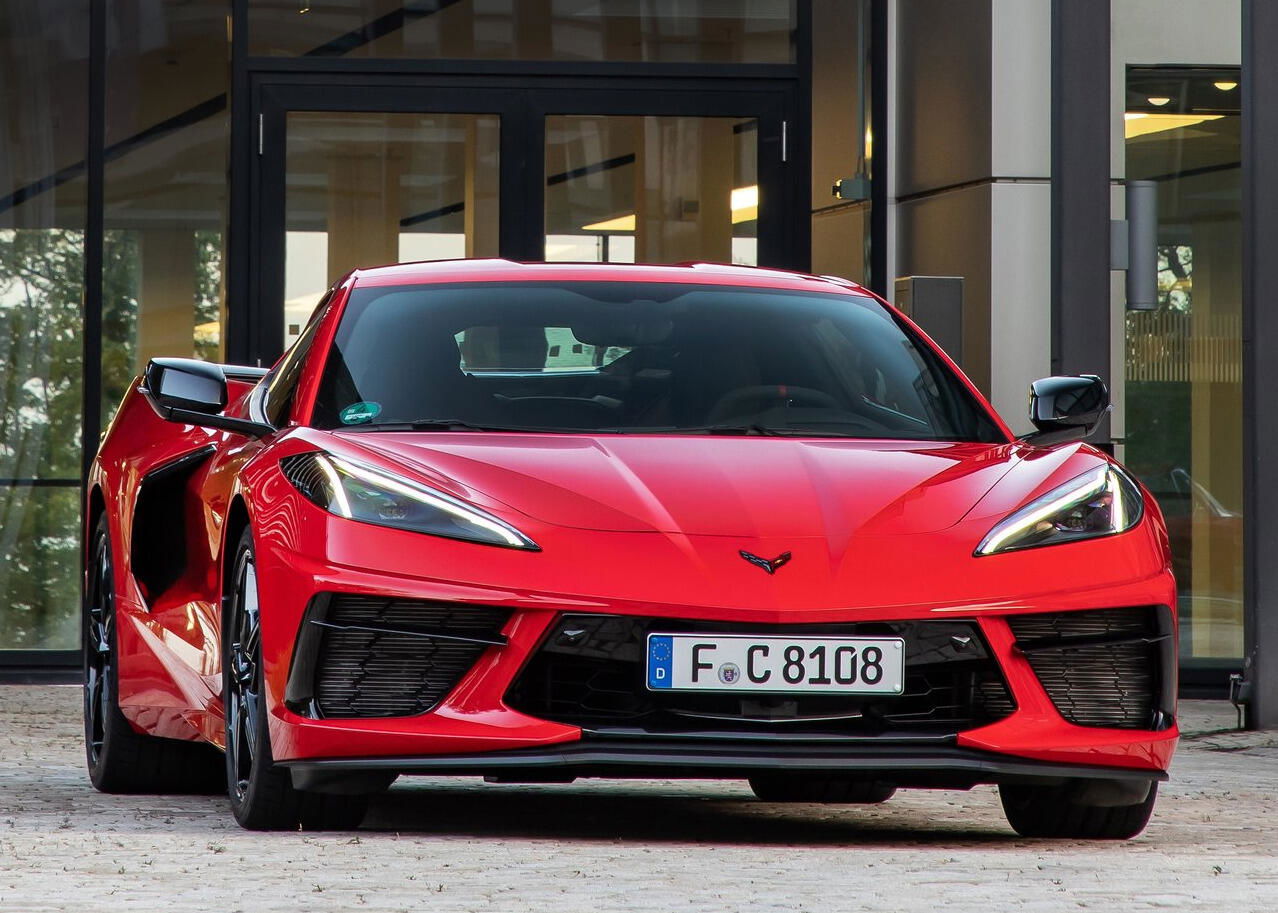
Let's cut the polite talk; the 2025 Corvette Stingray isn't just "good for the price." It's a flat-out supercar assassin that happens to wear a Chevrolet badge. At $68,300, it delivers performance that embarrasses cars costing twice as much, and it does it with a swagger that's pure Detroit muscle.
The Powertrain: A V8 That Doesn't Play Fair
The 6.2L naturally aspirated LT2 V8 (490 hp, 465 lb-ft) is a middle finger to turbocharging. No lag, no fake noise; just instant, snarling response. Paired with the 8-speed dual-clutch transmission, it rockets to 60 mph in 2.9 seconds. That's quicker than a base 911 Carrera. The exhaust note is a guttural howl that’ll make you ignore any podcast, ever.
Mid-Engine Magic: Finally, a Corvette That Corners Like It’s Angry
The move to a mid-engine layout wasn’t just for show. The Stingray’s near-perfect 48/52 weight distribution and magnetic ride control make it shockingly agile. Push it hard, and it doesn’t understeer like the old front-engine ‘Vettes. It rotates like it’s on ball bearings.
The Brembo brakes are brutally effective, with zero fade even after back-to-back track laps.
Cockpit: Fighter Jet Meets Silicon Valley
The interior finally matches the performance. The 12-inch digital cluster is crisp and configurable, with a head-up display that projects your speed in huge, "you're going to jail" numbers. The squared-off steering wheel? Thick-rimmed, Alcantara-wrapped, and begging to be thrown into corners.
Daily Drivability? Yes, Actually
Unlike most track weapons, the Stingray doesn’t punish you. The GT2 seats are supportive yet comfortable, and the trunk (yes, it has one) fits two golf bags. The infotainment system is intuitive, with wireless Apple CarPlay and a 14-speaker Bose system that doesn’t drown out the V8.
The Verdict: A Bargain That Shouldn’t Exist
The 2025 Stingray isn’t just the best performance value under $70K; it’s a legitimate exotic. It out-accelerates cars twice its price, out-handles most "luxury" sports cars, and does it all while looking like it costs six figures. The only downside is your Porsche-owning neighbor who will hate you.
Aside: If you buy anything else in this price range, you’re overthinking it.
2. 2025 Porsche 718 Cayman: The Purist's Scalpel
- Price: Starts at $68,300
- Engine: 2.0L Turbo Flat-4 (300 hp)
- Performance: 0-60 mph in 4.9 sec (PDK)
- Key Features: Precision handling, premium interior, iconic Porsche design

Let's be clear: The 2025 Porsche 718 Cayman doesn't win spec sheet battles. It wins where it matters: the unshakable grin plastered across your face as you carve through corners like a surgeon. At $68,300, it's not the fastest car under $70K, but it might just be the most rewarding.
The Heart of the Matter: A Turbocharged Boxer That Punches Above Its Weight
Yes, the base 2.0L turbo flat-four "only" makes 300 hp. But numbers lie. The Cayman's mid-engine balance and 7-speed PDK transmission (4.9s 0-60) transform those horses into pure driving nirvana. The power builds linearly and urgently, with a metallic snarl that crescendos at 7,500 rpm.
Want more drama? The optional 6-speed manual turns every gear change into an event.
Chassis: A Masterclass in Physics-Defying Handling
This is where the Cayman eclipses its rivals. The steering is telepathic. Every input translates instantly, with just the right amount of weight. The chassis is neutral to a fault, letting you adjust your line mid-corner with throttle or brakes.
Push too hard, and it doesn't snap—it communicates, giving you time to correct. The result is that you drive faster, smoother, and with more confidence than in any other car at this price.
Interior: Minimalist Perfection
The cabin is a masterstroke of purposeful design. The standard 10.9-inch touchscreen is responsive, but Porsche wisely keeps physical buttons for critical functions. The slim, grippy steering wheel frames a clean gauge cluster with an analog tach front and center.
The seats are firm yet supportive, holding you perfectly during hard cornering. It's not lavish: It's driver-focused, and that's the point.
Daily Reality: Surprisingly Livable
Unlike some track-focused toys, the Cayman works in the real world. The trunk and frunk combine for 15 cubic feet of storage, enough for a weekend getaway. The ride, even on 20-inch wheels, is firm but never punishing. And the build quality is flawless, as expected from Porsche.
The Verdict: The Driver's Choice
The 718 Cayman isn't about brute force. It's about finesse. It rewards skill, flatters mistakes, and makes even a grocery run feel special. While others chase horsepower figures, the Cayman masters the art of driving.
Aside: If you care more about the journey than the destination, there's nothing better at any price.
3. 2025 BMW M240i xDrive Coupe: The Wolf In Sheep's Clothing
- Price: $59,700
- Engine: 3.0L Turbo I6 (382 hp)
- Performance: 0-60 mph in 4.1 sec
- Key Features: AWD, 14.9-inch curved display, sport-tuned suspension
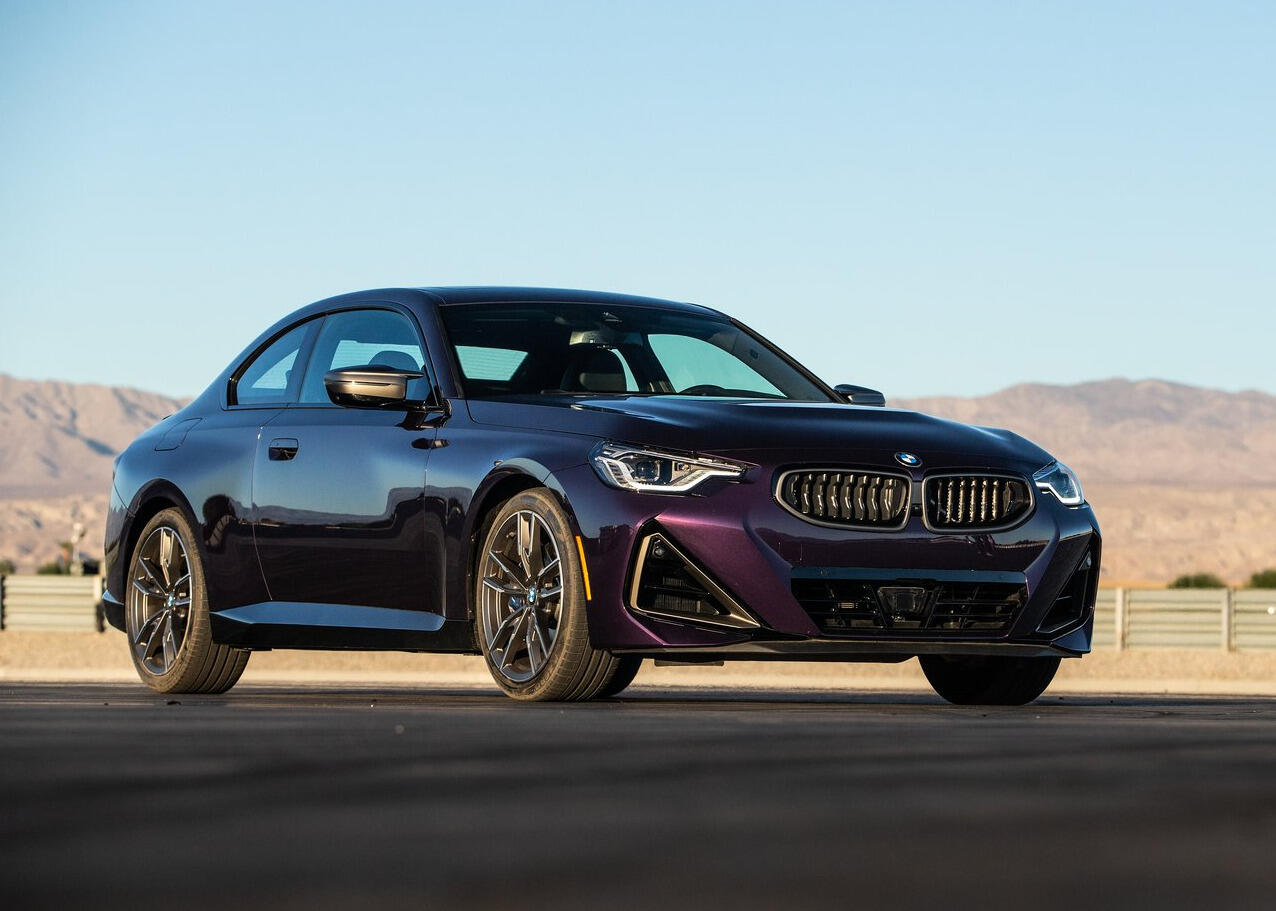
Don't let its compact dimensions fool you. The 2025 BMW M240i xDrive is a 384-hp sledgehammer wrapped in a tidy package. Starting at $59,700, this pocket rocket delivers M-car thrills without the M-tax, proving that BMW hasn't forgotten how to build driver's cars that actually excite.
Powertrain: Bavarian Muscle Done Right
The heart of the M240i remains its glorious 3.0L turbocharged B58 inline-six, now tuned to 382 hp and 369 lb-ft of torque. Paired with xDrive AWD and an 8-speed automatic, it slingshots to 60 mph in 4.1 seconds, quicker than last decade's M3.
The power delivery is brutally linear, with a torque curve flatter than Germany's Autobahn and a snarling exhaust note that's been carefully preserved despite emissions regulations.
Chassis: Grip for Days
While purists might mourn the move to AWD-only, the xDrive system here is magical. In normal driving, it's rear-biased, letting the tail dance on throttle lifts. When things get serious, it transforms into a grip monster, clawing out of corners with tenacity that shames RWD competitors.
The optional M Adaptive Suspension keeps body roll in check without beating you up on bad roads, a rare feat in this segment.
Tech: The Right Kind of Overkill
The M240i's cabin is dominated by BMW's 14.9-inch curved display, which runs the latest iDrive 8.5 system. While some may lament the loss of physical buttons, the interface is intuitive and responsive, with crisp graphics and wireless Apple CarPlay.
The standard 12.3-inch digital cluster is equally impressive, offering multiple layouts including a full-screen navigation view.
Daily Driving: Shockingly Practical
Unlike some of its harder-edged rivals, the M240i remembers it's still a BMW. The trunk holds 13.8 cubic feet of cargo, rear seats fold for longer items, and the standard comfort seats offer both support and all-day comfort.
Road noise is well-contained, and the optional Harman Kardon audio system delivers concert-hall quality.
The Verdict: The Complete Package
The M240i xDrive delivers 90% of an M2's performance at 75% of the price, with better daily manners to boot. It's proof that you don't need to spend six figures to get German engineering at its best.
Aside: If you want one car that does it all—blistering acceleration, all-weather capability, and daily comfort—look no further.
See also:
4. 2025 Ford Mustang Dark Horse: The Last Of The American V8 Gladiators
- Price: $62,000
- Engine: 5.0L V8 (500 hp)
- Performance: 0-60 mph in 3.9 sec
- Key Features: Track-focused aerodynamics, Recaro seats, SYNC 4 infotainment
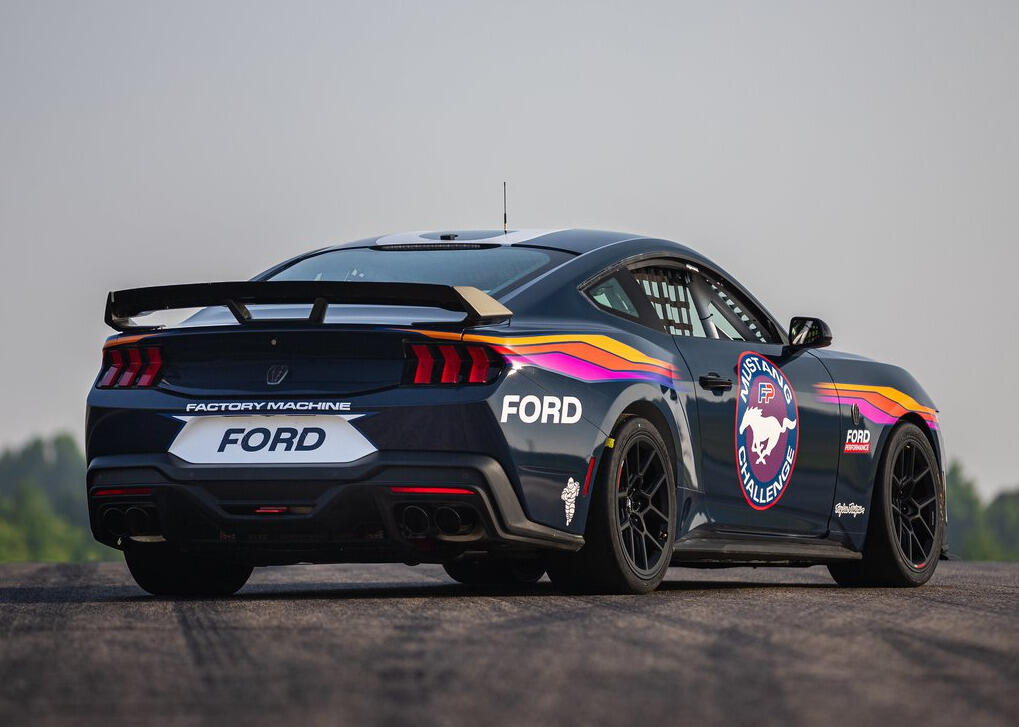
This isn't just another Mustang. The 2025 Dark Horse is Ford's swan song to unfiltered American muscle, a 500-hp middle finger to electrification that proves internal combustion isn't going quietly. At $62,000, it's the most track-capable production Mustang ever built. A street-legal race car that still knows how to party.
The Heart of the Beast: Coyote V8 Perfected
The Dark Horse's 5.0L Coyote V8 isn't just powerful. It's savagely charismatic. With 500 hp and 418 lb-ft of torque, it rips to 60 mph in 3.9 seconds (with the 10-speed auto) while delivering a symphony of mechanical violence.
Unlike turbocharged rivals, this engine thrives on rpm, pulling hard to its 7,500 rpm redline with an exhaust note that crackles on overrun like a bonfire of gasoline-soaked tires. The optional Tremec 6-speed manual (with rev-matching) turns every shift into an event.
Track Weapon, Disguised as a Pony Car
Ford didn't just bolt on a body kit—they reengineered the fundamentals. The standard MagneRide dampers keep this 3,800-lb beast planted, while the rear diff cooler and standard Brembo brakes (15.4" front rotors) laugh at track-day abuse.
The aerodynamic package (functional hood vents, rear spoiler) generates real downforce at speed, something no Mustang has ever done well. The result is cornering grip that defies physics for something this size.
Cockpit: Detroit Meets Daytona
Slide into the standard Recaro seats (with aggressive bolsters) and you're greeted by a driver-focused layout. The 12.4-inch digital cluster offers a track-ready display with lap timers and g-meters, while SYNC 4 infotainment keeps things modern.
The thick-rimmed steering wheel and aluminum shift knob (on manuals) feel purpose-built. This isn't some luxury pretender.
Daily Reality? Surprisingly Tame
Despite its track focus, the Dark Horse remembers it's still a Mustang. The ride in normal mode is firm but livable, the back seats are usable for humans under 5'8", and the trunk fits 13.5 cubic feet of gear. Road noise is present but not oppressive—though you'll likely keep the windows down to hear that V8 anyway.
The Verdict: An American Icon Goes Out Fighting
The Dark Horse isn't just the most capable Mustang ever; it's a cultural statement. In an era of hybrids and silent speed, it delivers raw, unfiltered V8 thrills with genuine track credentials.
Aside: This is the Mustang you'll tell your grandkids about.
5. 2025 Lexus RC F: The Japanese Muscle Car That Refuses To Compromise
- Price: $67,145
- Engine: 5.0L V8 (472 hp)
- Performance: 0-60 mph in 4.2 sec
- Key Features: Lexus reliability, premium cabin, adaptive suspension
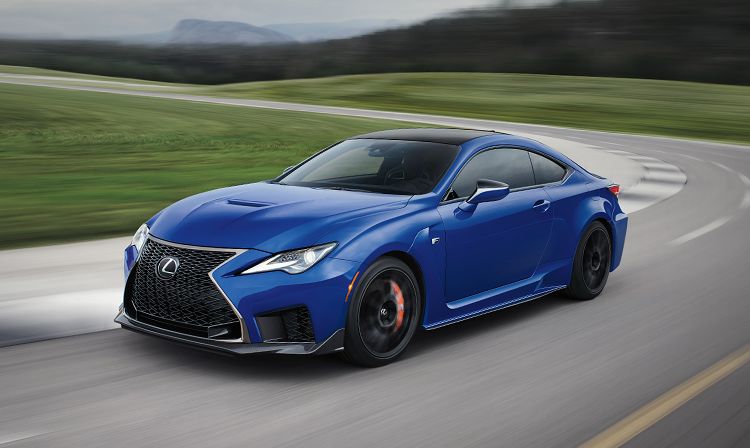
In a world gone soft with turbochargers and hybrid systems, the 2025 Lexus RC F stands as a samurai-willed V8 purist, delivering 472 hp of naturally aspirated fury wrapped in a bulletproof Japanese package.
At $67,145, it's not the fastest nor the lightest in its class—but it might be the most characterful and dependable performance coupe money can buy.
Atmospheric Warfare: The 5.0L V8 That Time Forgot
While competitors downsized to turbo-sixes, Lexus doubled down on its glorious 5.0L V8. The 472-hp powerplant is a mechanical unicorn in 2025, delivering linear power with an intoxicating crescendo to its 7,300 rpm redline.
The 0-60 mph sprint of 4.2 seconds doesn't tell the full story. This engine lives in the high rpm band, rewarding drivers who work the precise 8-speed automatic with paddle shifters. The exhaust note is a basso profundo roar that makes modern turbo engines sound anemic by comparison.
Chassis: Heavy, But Surprisingly Agile
Yes, at 3,950 lbs, the RC F is no featherweigh. But Lexus engineers worked magic with its adaptive suspension and rear-wheel steering. The Torque Vectoring Differential (standard) makes this heavyweight dance through corners with unexpected grace, while the available Sport+ mode sharpens responses without ruining ride quality.
The steering is meaty and communicative—a rarity in today's numb, electric-assisted world.
Interior: Samurai Dojo Meets Luxury Lounge
The RC F's cabin is a masterclass in Japanese craftsmanship. Hand-stitched leather, real aluminum trim, and ultra-supportive seats create an environment that's both luxurious and driver-focused.
The 12.3-inch infotainment screen (finally with touch capability) runs Lexus' latest interface, while the Mark Levinson audio system delivers concert-hall quality. It's quieter at speed than German rivals, unless you open the exhaust valves.
Daily Drivability: The Grown-Up's Performance Car
Unlike some raw sports cars, the RC F remembers it's a Lexus. The adaptive suspension soaks up bumps in Comfort mode, the trunk fits 10.4 cubic feet of cargo, and the legendary Toyota reliability means you won't be visiting dealers for mysterious check-engine lights.
The safety tech suite is comprehensive without being intrusive, perfect for both canyon runs and commutes.
The Verdict: An Endangered Species Worth Protecting
The RC F isn't trying to be something it's not. It's unapologetically heavy, gloriously analog, and built to last decades. In an era of disposable performance, it's a keeper.
Aside: If you want a thrilling V8 coupe that will still be running flawlessly when your neighbor's European sports car is on its third owner and fifth major repair, the RC F is your mechanical soulmate.
6. 2025 Audi TTS (Coupe): The Tech-Infused Precision Instrument
- Price: $61,900
- Engine: 2.0L Turbo I4 (288 hp)
- Performance: 0-60 mph in 4.5 sec
- Key Features: Quattro AWD, virtual cockpit, sleek design
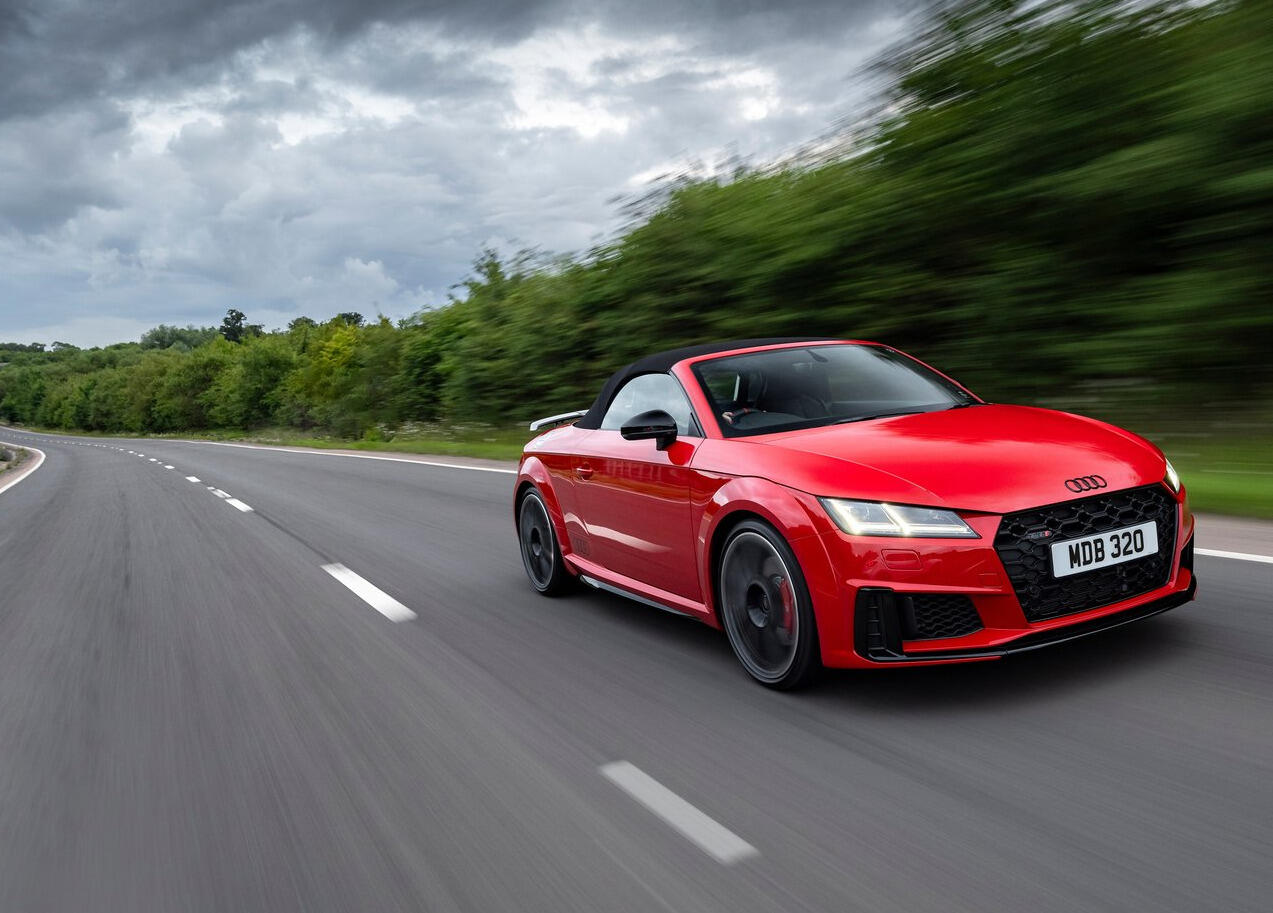
Audi's 2025 TTS Coupe proves you don't need massive horsepower numbers to deliver driving exhilaration. At $61,900, this compact German bruiser combines quattro AWD grip, razor-sharp handling, and cutting-edge tech into one of the most complete performance packages under $70K.
While its 2.0L turbo-four may seem modest on paper, the TTS delivers a driving experience that's greater than the sum of its specs.
Powertrain: Small But Mighty
The 288-hp 2.0T engine is an exercise in forced-induction efficiency, delivering peak torque (280 lb-ft) from just 1,950 rpm. Mated to Audi's brilliant 7-speed S-tronic dual-clutch transmission, it rockets to 60 mph in 4.5 seconds, quicker than the numbers suggest thanks to its explosive mid-range punch.
The quattro all-wheel-drive system provides telepathic grip in all conditions, making this one of the few true all-weather sports cars.
Chassis: German Precision Personified
Audi's magnetic ride adaptive suspension gives the TTS two distinct personalities: Comfort mode for daily driving and a razor-sharp Dynamic mode that transforms the coupe into a corner-carving machine.
The electromechanical steering is direct and weighty, while the standard sport differential enhances agility. At just 3,197 lbs, the TTS feels light on its feet compared to heavier rivals.
Virtual Cockpit: The Best Tech in the Business
The TTS's cabin revolves around Audi's 12.3-inch Virtual Cockpit, which remains the gold standard for digital displays. The system's performance-oriented view puts the tach front and center, with navigation and vehicle data orbiting around it.
The minimalist interior features exquisite materials, including available Nappa leather and genuine aluminum trim. Every control feels damped to perfection. This is German ergonomics at its finest.
Daily Usability: The Thinking Person's Sports Car
Unlike more extreme performance machines, the TTS remembers it's still an Audi. The ride remains civilized even on 20-inch wheels, the hatchback design offers surprisingly usable cargo space (12.1 cu ft), and standard driver assists make highway cruising effortless.
The cabin is library-quiet when you want it to be—until you open up that 2.0T's exhaust valves.
The Verdict: Sophisticated Speed
The 2025 TTS is less about brute force and more about precision engineering and all-weather capability. It delivers 90% of an R8's driving thrill at less than half the price, wrapped in a package you can live with every day.
Aside: For drivers who value technical perfection over raw horsepower numbers, the TTS represents one of the smartest performance buys on the market. It's proof that in the right hands, 288 hp can be more satisfying than 400.
7. 2025 Nissan Z Performance: The Rebel With a Cause
- Price: Up to $67,000
- Engine: 3.0L Twin-Turbo V6 (400 hp)
- Performance: 0-60 mph in 4.3 sec
- Key Features: Retro-modern styling, manual transmission option
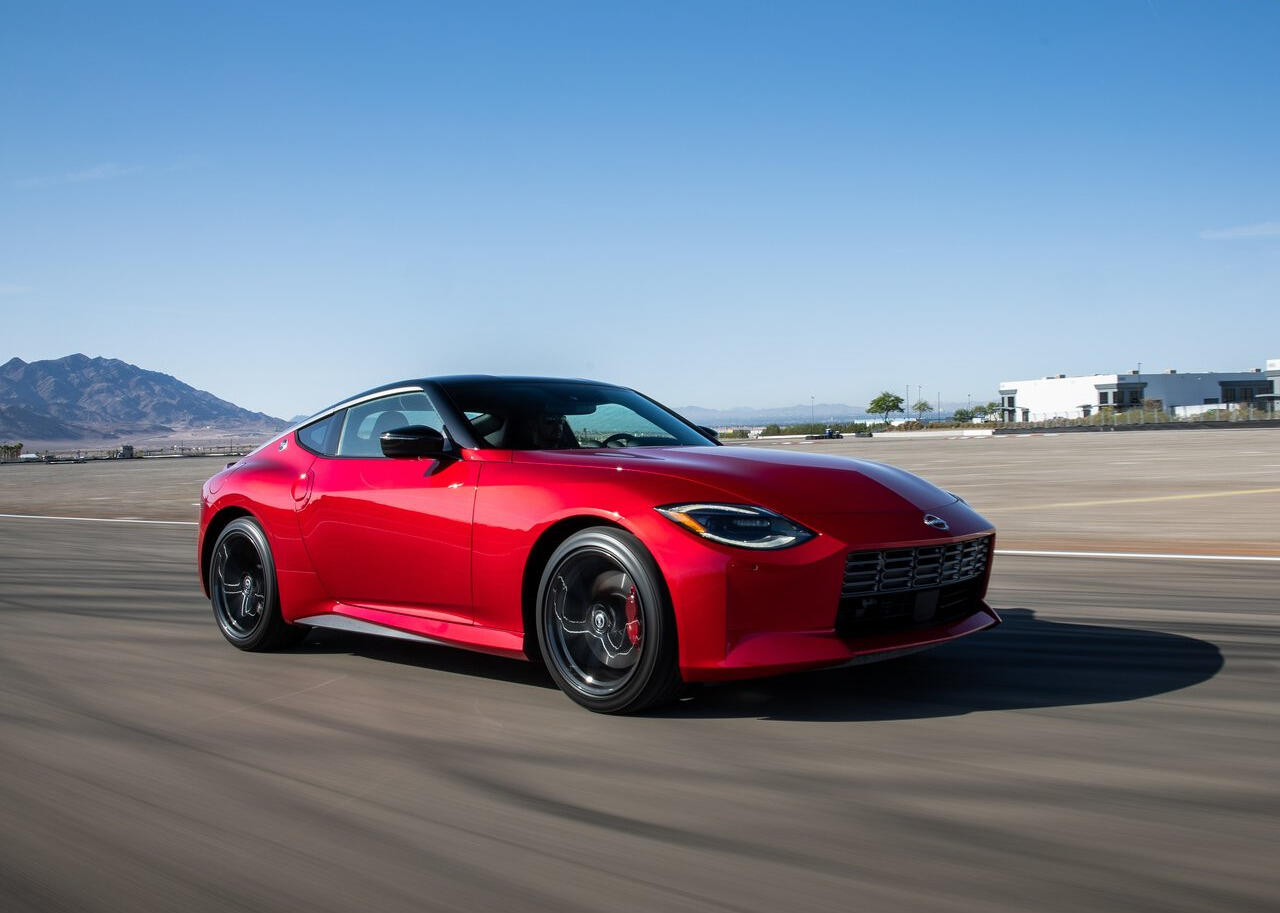
The 2025 Nissan Z Performance isn’t here to play by the rules. While rivals chase hybrid tech and autonomous driving, this unapologetic throwback delivers raw, analog thrills with a twin-turbo V6 snarl and a proper six-speed manual. Priced at $67,000, it’s not just one of the fastest cars under $70K; it’s a middle finger to conformity in the best way possible.
See also:
Heart of the Beast: Twin-Turbo V6 Fury
Nissan’s 3.0L twin-turbo V6 pumps out 400 hp and 350 lb-ft of torque, rocketing the Z to 60 mph in 4.3 seconds (4.1 with the 9-speed auto).
But numbers don’t capture the drama. The engine delivers a broad, muscular powerband, with turbos that spool aggressively but without lag. The exhaust note is a growling, metallic howl, especially in Sport+ mode. And yes, the 6-speed manual (with rev-matching) is still available, making this one of the last true driver’s cars in its class.
Chassis: Old-School Fun, Modern Grip
The Z’s rear-wheel-drive platform is simple but effective, with a limited-slip differential and adaptive dampers (on Performance trim) keeping it planted.
The steering is heavy and direct, offering real feedback—a rarity in today’s numb, electric-assisted world. It’s not as razor-sharp as a Porsche, but that’s the point; this car thrives on attitude, encouraging playful slides and smoky burnouts.
Design: Retro Done Right
The Z’s styling is a love letter to its ancestors, with a long hood, short rear, and that iconic squared-off grille. The LED lighting and modern proportions keep it fresh, while the available two-tone paint schemes (like the bold Ikazuchi Yellow) ensure it stands out in a sea of gray German coupes.
Inside, the cabin blends retro cues (like analog gauges) with modern tech, including an 8.0-inch touchscreen and digital instrument cluster.
Daily Reality? Surprisingly Livable
For a car this focused, the Z is remarkably easy to live with. The ride is firm but not punishing, the seats are supportive yet comfortable, and the trunk fits 6.9 cubic feet of gear, enough for a weekend trip.
The infotainment system is straightforward, with Apple CarPlay and Android Auto, though it lacks the polish of German rivals.
The Verdict: A Dying Breed Worth Celebrating
The 2025 Nissan Z Performance isn’t the most refined or tech-heavy sports car under $75K, but it’s one of the most exciting. It’s a rare blend of modern power and old-school charm, offering thrills that turbo-four rivals can’t match.
Aside: If you want one of the last true driver’s cars—with a manual transmission, rear-wheel drive, and a snarling V6—the Z is your best bet under $70K. It’s fast, fun, and full of personality, exactly what a best sports car for under 70k should be.
8. 2025 Toyota GR Supra 3.0: The Bavarian-Japanese Rocket
- Price: $56,250–$59,400
- Engine: 3.0L Turbo I6 (382 hp)
- Performance: 0-60 mph in 3.9 sec
- Key Features: BMW-sourced powertrain, agile handling
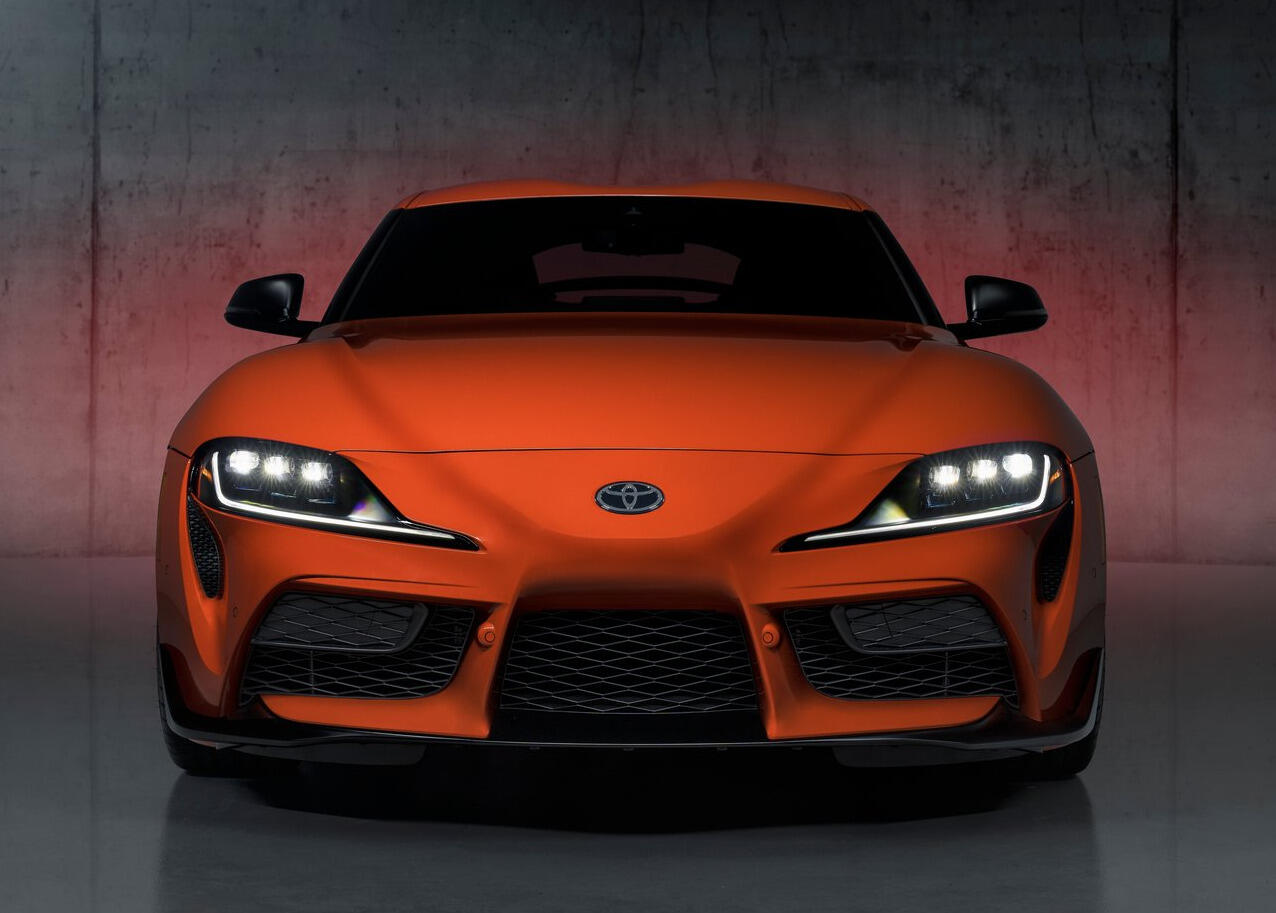
The 2025 GR Supra 3.0 remains one of the most compelling sports cars under $70K, blending BMW's silky-smooth inline-six with Toyota's razor-sharp tuning.
Starting at $56,250 (or $59,400 for the premium 3.0 Premium trim), this collaboration delivers supercar-slaying performance at a fraction of the cost, proving that the best cars under 70k can still deliver white-knuckle thrills.
Powertrain: BMW’s Brilliance, Toyota’s Edge
At its heart lies BMW’s B58 3.0L turbocharged inline-six, now tuned to 382 hp and 368 lb-ft of torque. Mated to an 8-speed automatic (a 6-speed manual is optional), it catapults to 60 mph in 3.9 seconds, quicker than a base Porsche 718 Cayman.
The power delivery is buttery smooth, with near-instant throttle response and a sonorous exhaust note that crescendos to 7,000 rpm. The manual version, while slightly slower (4.2s 0-60), offers unmatched driver engagement for purists.
Chassis: A Masterclass in Balance
Toyota’s Gazoo Racing team worked magic here. The Supra’s short wheelbase and near-perfect 50/50 weight distribution make it ridiculously agile, with turn-in so sharp it feels telepathic.
The adaptive suspension (standard on 3.0 models) offers compliant comfort in Normal mode and track-ready stiffness in Sport. Even with rear-wheel drive, the Supra feels planted and predictable, encouraging you to push harder with every corner.
Design: Function Meets Flash
The Supra’s styling remains bold and aerodynamic, with a double-bubble roof, muscular haunches, and an aggressive front fascia.
The 2025 model adds new color options, including a stunning Matte Storm Gray. Inside, the driver-focused cabin features a head-up display, 8.8-inch infotainment screen (with wireless CarPlay), and supportive sport seats. It’s more minimalist than German rivals, but every control feels intuitive and precise.
Daily Driving: Surprisingly Civilized
For a car this sharp, the Supra is remarkably livable. The ride is firm but not harsh, visibility is decent (unlike some mid-engine rivals), and the trunk fits 10.2 cubic feet of cargo, enough for a weekend getaway.
The lack of rear seats keeps the focus purely on driving, making it one of the best 70k cars for the sort of blokes who prioritize performance over practicality.
The Verdict: A Bargain Supercar
The GR Supra 3.0 punches far above its price tag, offering near-M2-level performance with Toyota’s reliability. It’s proof that the best sports cars under 70k don’t need hybrid tech or all-wheel drive—just brilliant engineering and a focus on driving joy.
Aside: If you want a BMW M-lite experience without the premium badge tax, the Supra is your ticket. It’s fast, fun, and full of character—exactly what a best car under 70k should be.
9. 2025 Mercedes-Benz CLA 45 AMG: The Pocket-Sized Powerhouse
- Price: $67,050
- Engine: 2.0L Turbo I4 (382 hp)
- Performance: 0-60 mph in 4.0 sec
- Key Features: AMG-tuned chassis, dual-screen MBUX system
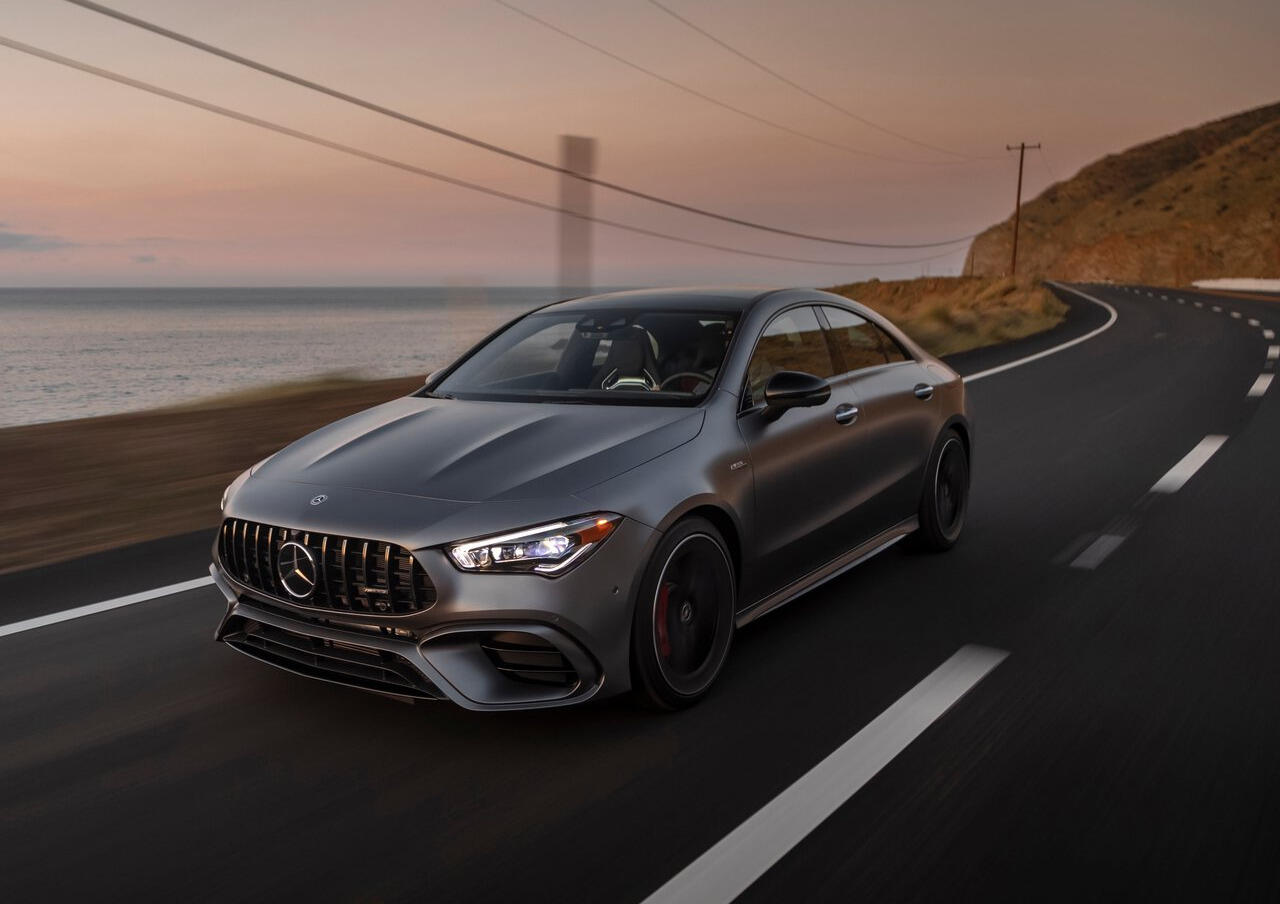
At $67,050, the 2025 CLA 45 AMG redefines what a 2.0L turbo-four can do, standing tall among the most compelling 2025 under $70k sports cars. This isn't just a hot sedan; it's an AMG-honed weapon that combines supercar-rivaling power with everyday practicality. It's simply one of the most versatile cars around 70k.
Engine: Black Magic Under the Hood
Mercedes-AMG's hand-built M139 2.0L turbocharged four-cylinder is a engineering marvel, pumping out 382 hp and 354 lb-ft to become the most powerful production four-cylinder in the world.
Paired with an 8-speed dual-clutch transmission and AMG Performance 4MATIC+ all-wheel drive, it rockets to 60 mph in 4.0 seconds flat. The power delivery is explosive yet refined, with a snarling exhaust note that crackles on overrun. The launch control system feels like being shot from a cannon every time.
Chassis: German Precision Meets AMG Brutality
The CLA 45's AMG-tuned suspension delivers track-ready sharpness without sacrificing daily comfort. The rear-biased 4MATIC+ AWD system can send up to 50% of power to the rear wheels, allowing for surprisingly playful handling when pushed.
The AMG Dynamic Select system offers five drive modes, including a Drift Mode that disconnects the front axle for tail-happy antics. The steering is telepathically quick, making this four-door feel more agile than many two-door sports cars.
Interior: S-Class Tech in a Compact Package
The CLA 45's cabin punches far above its price point, featuring Mercedes' stunning dual 10.25-inch MBUX displays (now with augmented reality navigation).
AMG-specific touches include sport seats with microsuede inserts, a thick-rimmed steering wheel with aluminum shift paddles, and AMG Track Pace data logging. The ambient lighting system (with 64 colors) and Burmester audio transform it into a tech showcase when you're not attacking backroads.
Daily Usability: The Grown-Up's Hot Rod
Unlike more extreme 2025 under $70k sports cars, the CLA 45 offers real practicality: Useable rear seats (unlike coupe competitors), 13.1 cu-ft trunk (larger than a BMW 2 Series), Comfort suspension mode that soaks up bumps, and full suite of driver assists for stress-free commuting.
The Verdict: The Complete Performance Package
The CLA 45 AMG delivers 90% of an AMG GT's thrill with 200% more practicality. It's proof you don't need to sacrifice usability to own one of the most exciting cars around 70k.
Aside: For drivers who refuse to choose between family-friendly space and heart-stopping performance, this is the ultimate 2025 under $70k sports car—a German engineering masterpiece that thrills on weekends and commutes on Mondays.
10. 2025 Genesis G70 3.3T Sport Prestige: The Luxury Dark Horse
- Price: $56,175
- Engine: 3.3L Twin-Turbo V6 (365 hp)
- Performance: 0-60 mph in 4.5 sec
- Key Features: Luxury interior, RWD/AWD options
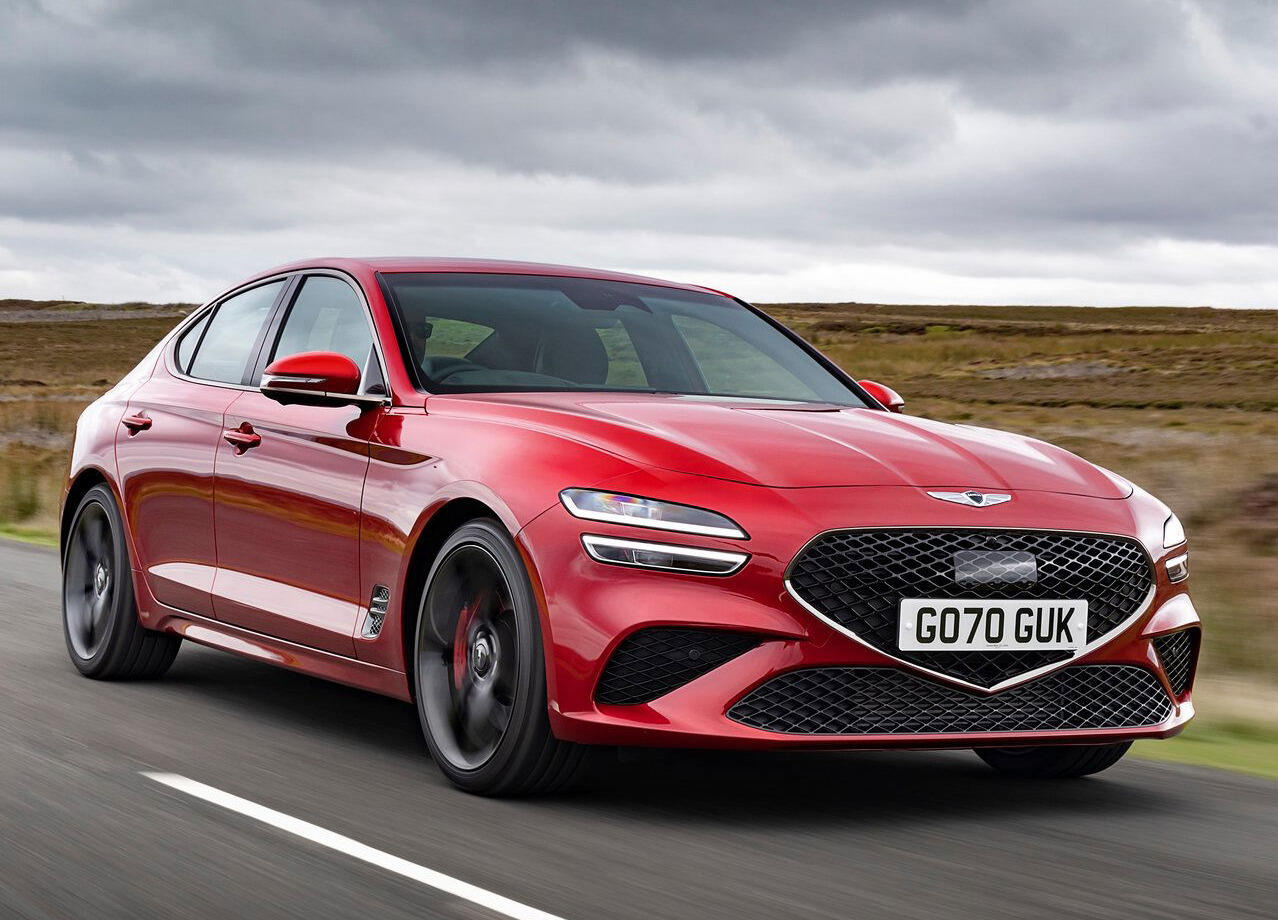
At $56,175, the 2025 Genesis G70 3.3T Sport Prestige delivers a knockout punch to European rivals, offering BMW M340i performance at 330i pricing. This Korean sensation combines a 365-hp twin-turbo V6 with sumptuous luxury, making it one of the most compelling performance bargains in the luxury sports sedan segment.
Powertrain: Korean Muscle Meets Refinement
The 3.3L twin-turbo V6 is a torque monster, delivering 365 hp and 376 lb-ft from just 1,300 rpm. Paired with an 8-speed automatic and available AWD, it achieves 0-60 mph in 4.5 seconds, matching Audi S4 acceleration at a $10K discount.
The power delivery is urgent yet velvety, with a muted but purposeful exhaust note. The optional Sport+ mode sharpens throttle response and adds aggressive transmission mapping for backroad blasts.
Chassis: Precision With a Plush Edge
Genesis tuned the G70's suspension to split the difference between sport and luxury perfectly. The electronically controlled dampers (standard on Sport Prestige) offer remarkable body control without sacrificing ride quality.
The rear-wheel-drive bias (with available AWD) gives it playful character missing from some German rivals. The steering is weighty and direct, though not quite as telepathic as a BMW's.
Interior: A $90K Cabin at $56K
The G70's cabin humiliates its European rivals with hand-stitched Nappa leather seats featuring exquisite quilted stitching, genuine brushed aluminum and matte wood trim that radiates sophistication, a Lexicon premium audio system pumping 630 watts through 15 speakers, and a cutting-edge 3D digital instrument cluster with augmented reality navigation.
Every surface you touch feels meticulously crafted and undeniably premium, cementing Genesis' position as a true luxury contender.
Daily Driving: The Perfect Balance
The G70 achieves remarkable balance that harder-edged competitors can't match. Its 10.5 cubic-foot trunk proves surprisingly practical despite compact dimensions, while the whisper-quiet cabin benefits from sound-deadening double-paned glass.
Genesis equips the G70 with comprehensive driver assistance systems, including advanced highway driving aids, and backs it all with an industry-leading 10-year powertrain warranty that puts German manufacturers to shame.
The Verdict: The Smart Buyer's Sports Sedan
The G70 3.3T offers 90% of the M340i experience at 75% of the price, wrapped in a more exclusive package. It's proof that luxury performance doesn't require a German badge—just brilliant engineering and value.
Aside: If you want V6 thrust, luxury trimmings, and long-term value without the premium brand tax, the G70 Sport Prestige is the steal of the year in the luxury performance segment.
Honorable Mentions: Two Wildcards That Almost Made the Cut
While they didn't quite crack our top 10, these two performance machines deserve recognition for pushing boundaries in their respective categories.
BMW M2
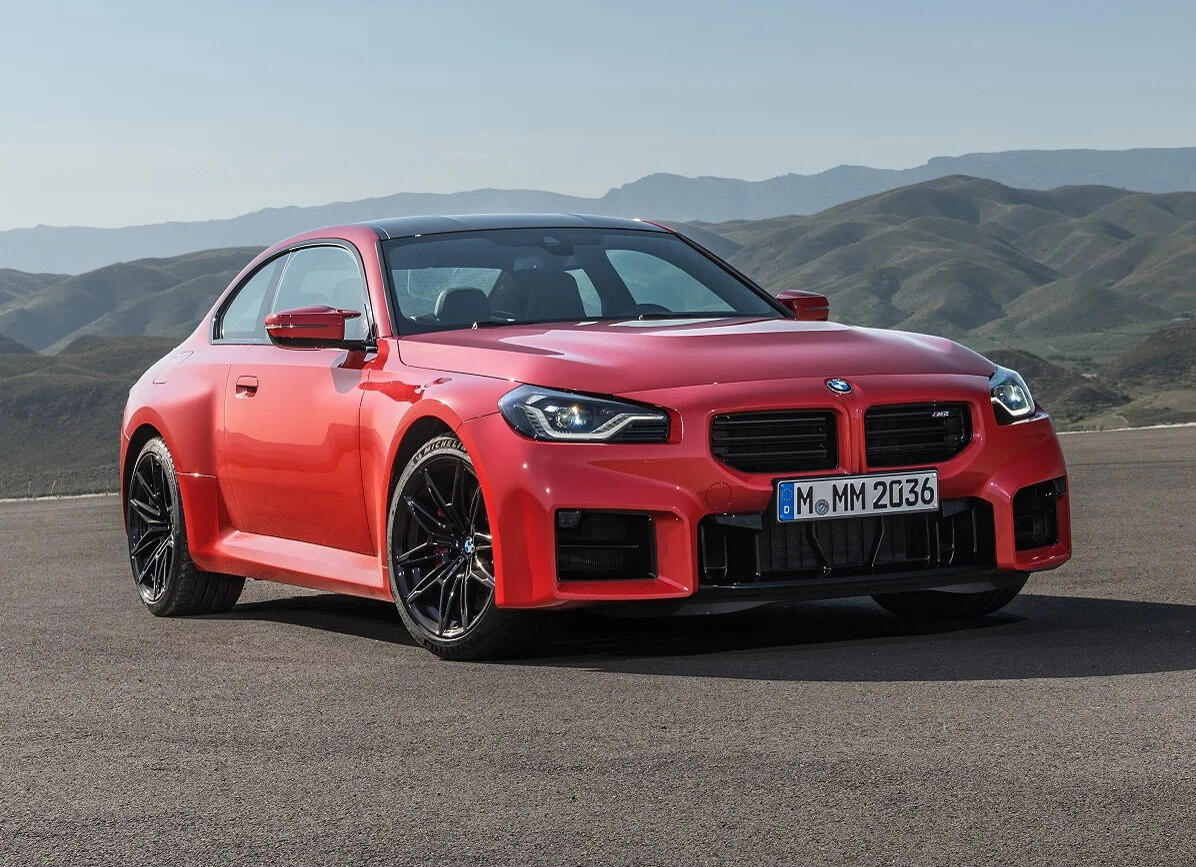
The 2025 BMW M2 ($66,675) continues to be the gold standard for compact rear-drive thrills, packing a 453-hp twin-turbo inline-six that screams to 7,200 rpm. Its razor-sharp handling and old-school hydraulic steering feel make it one of the purest driver's cars left in the digital age.
Dodge Charger Daytona EV
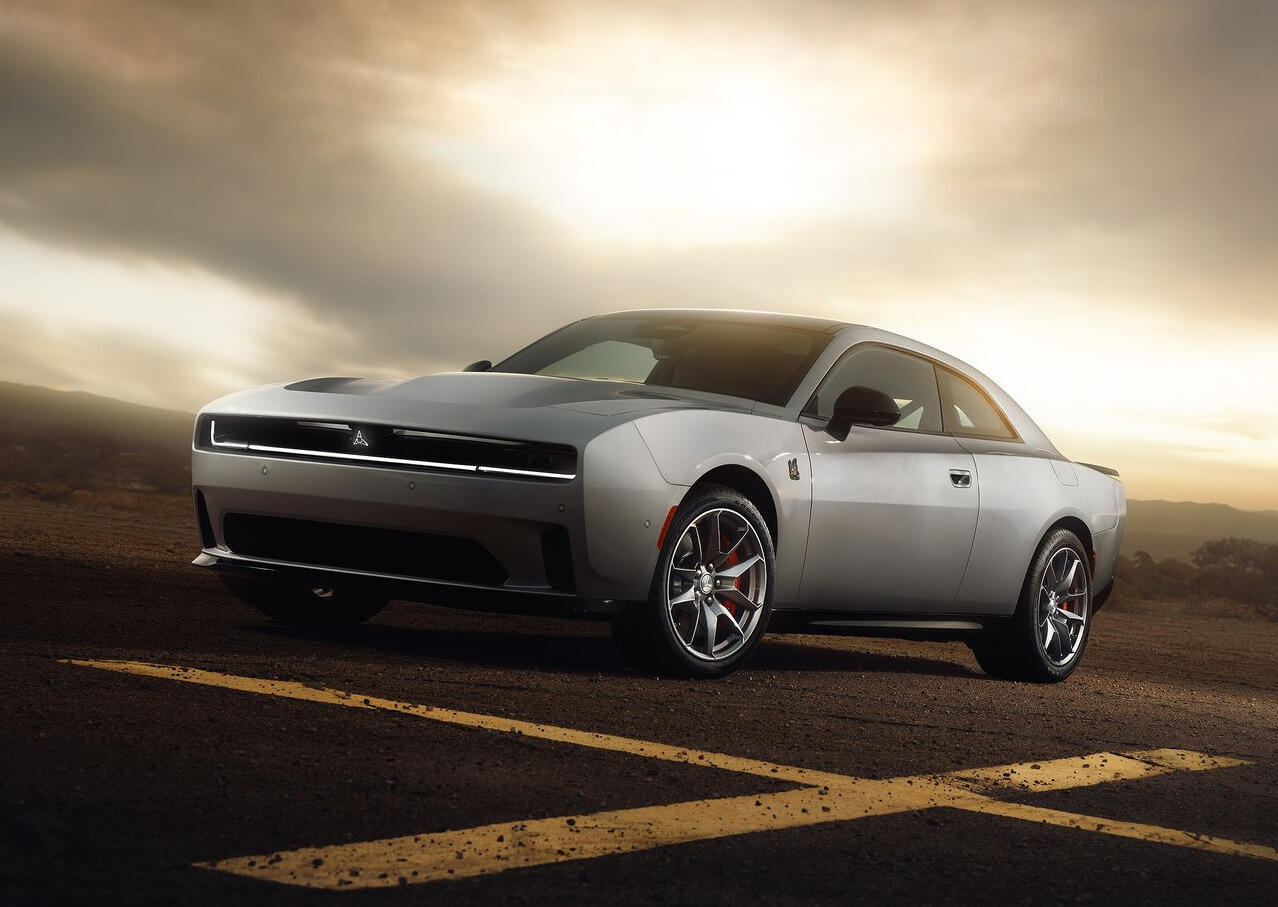
On the opposite end of the spectrum, the Dodge Charger Daytona EV represents the controversial future of American muscle. While specs are still emerging, early reports suggest its 400V "Banshee" powertrain will deliver Hellcat-rivaling acceleration with silent, emissions-free brutality.
The retro-futuristic styling and simulated gear shifts aim to please traditionalists, making it perhaps the only electric car that might satisfy V8 loyalists.
Buying Guide: Smart Choices for Your $70K Sports Car
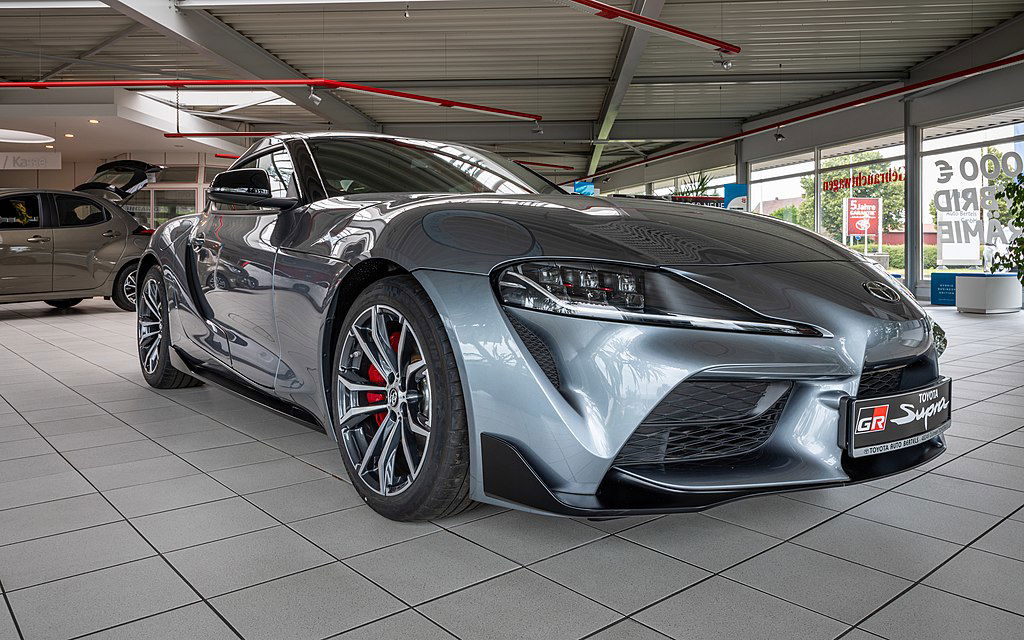
Choosing your perfect performance machine requires balancing priorities. New models offer cutting-edge tech and full warranties, while pre-owned examples (2-3 years old) can save 20-30% with most depreciation already absorbed.
Engine choice defines character: V8s deliver visceral power and soundtrack but guzzle fuel, while turbo-fours offer better efficiency with nearly equal acceleration. Don’t overlook hybrids; they’re changing the performance game.
Beware of options creep. That $5,000 carbon package or $8,000 ceramic brakes might thrill on paper, but resale value rarely reflects these add-ons. Focus on must-have performance upgrades (LSD, adaptive suspension) and skip the cosmetic fluff.
Ultimately, drive both extremes—raw analog machines and tech-loaded rockets—before deciding. Your ideal balance of thrills and practicality awaits.